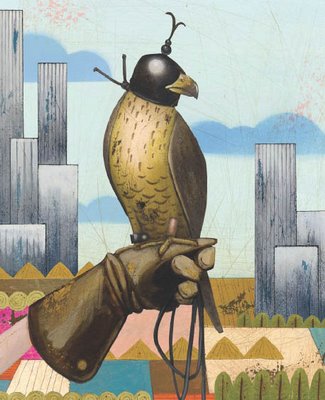
Falconer Rebecca O'Conner has a very nice piece in The Los Angeles Times' West magazine about the steady creep of sprawl and what it means for her and her falcons in Southern California. This is what sprawl means at its most personal and conflicted. For a previous piece from her, see "Good Writing, Good Reading."
For a longer book that also covers the creep of shopping centers on to hawking grounds, see Matthew Mullenix's book, In Season: A Louisiana Falconer's Journal.
A shout out to Querencia for bird-dogging me to all of this reading (and more) on a wide variety of subjects.
To carry forward the theme of population growth, sprawl and birds, I append, below, a short op-ed I ghosted for the CEO of the National Audubon Society a few years ago. Population growth continues to gut-shoot the planet, pushing people farther away from nature, while pushing nature closer to the abyss.
Nature bats last, however. Whether we are willing to acknowledge it or not, our time will come (as it does for all creatures).
As has been so famously said, perpetual growth is the ideology of the cancer cell. Sadly, unbridled human fecundity has become a cancer on the planet. All we can do now is pray for remission in the form of family planning.
Ventura County Star (California), April 20, 2003
Safeguarding wildlife: A wise investment
As you approach Los Angeles by air, you see less and less evidence of the hand of God, and more and more evidence of the footprint of man.
From the cabin of a 757 you can see where roads slice across desert ridges. Farm fields and irrigation ditches cut straight lines across the land. Housing tracts fan out like cards, until at last the streets of suburbia fall away to the grid lines of the city.
One hundred years ago, only the birds flew over the Simi Valley. At that time, the population of the state was less than 2 million. By 1950, the population had risen to 10 million. Since then, California's population has more than tripled.
As human numbers have soared in California, forests have fallen to farms, and farms have fallen to freeway. As human populations have exploded, habitats worldwide have been profoundly altered.
Just 300 miles northeast of Los Angeles lies Mono Lake, one of the largest natural lakes in California. Just 50 years ago, Mono Lake was home to nearly a million ducks. Today fewer than 20,000 dot its shores. The reason? Freshwater diversions for Los Angeles have reduced Mono Lake's volume by 40 percent over the last 50 years, thereby increasing the lake's salinity and reducing the plant and animal life it can support.
In Tanzania, the changing chemistry of Lake Natron threatens the only breeding ground of East Africa's lesser flamingos. In Central and South America, farms and roads have been burned and bulldozed into once pristine forests. The result: 50 percent of all migrant bird species that summer in the United States and winter in Central and South America, are now in decline.
What's killing them is fallout from the population explosion that has occurred over the last 50 years. While the developing world is hardly anxious to hear lectures about waste and consumption from a nation where families already own three television sets, these same people are -- literally -- dying for family planning.
The good news is that President Bush has said he is interested in increasing U.S. aid to poor countries by $5 billion over the next three years. The bad news is that Bush has yet to earmark any portion for contraceptive delivery to the developing world. He certainly ought to. The United Nations Children's Fund has observed that "Family planning could bring more benefits to more people at less cost than any other single technology now available to the human race."
Family planning would not only benefit human life -- it would benefit wildlife as well. By directing that a portion of this new aid money be spent on improved access to contraceptive services in the developing world, Bush could ensure that U.S. aid money was being spent wisely, while also working to improve human life and safeguard wildlife the world over. It's hard to imagine a wiser investment or one much easier for this president to make.
No comments:
Post a Comment